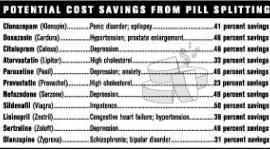What is an SNRI (Serotonin Norepinephrine Reuptake Inhibitor)?

SNRI antidepressants help relieve the symptoms of depression and anxiety.
The three main neurotransmitters (or neuromodulators) involved in depression are dopamine, norepinephrine and serotonin (also known as 5-HT). While their effect on mood is not completely clear, we do know that modulating these brain chemicals produces an antidepressant effect.
Initially, drugs specifically modulating serotonin (selective serotonin reuptake inhibitors, SSRIs) were developed, but now an additional class of medications that affect both serotonin and norepinephrine are common. These antidepressants are known as serotonin norepinephrine reuptake inhibitors (SNRIs).
Depression drugs included in the SNRI antidepressants class include:
- Desvenlafaxine (Pristiq)
- Duloxetine (Cymbalta)
- Milnacipran (Savella)
- Venlafaxine (Effexor, Effexor XR)
SSRIs vs. SNRIs
Are there differences among the SSRIs and SNRIs in achieving remission in patients with major depression?
Remission of depression in the patient is the doctor's main goal. According to Dr. Jeffrey Kelsey, Medical Director, Georgia Institute of Mood and Anxiety Disorders, all of the antidepressants available in the U.S. market today, including SSRIs and SNRIs, are equally effective when it comes to response rates.
Dr. Kelsey explains SSRIs vs. SNRIs in depression treatment,
"However, when it comes to remission, the data shows that SNRIs, dual-acting antidepressants, will, in some patients, confer an advantage. And the tricky part is going into it, we don't know which patients will benefit from one approach to the other.
SSRIs are very effective treatments but some patients are going to get more benefit from a dual-acting antidepressant."
Indications for Using SNRI Antidepressants
Serotonin-norepinephrine reuptake inhibitors are FDA-approved for treating major depressive disorder (MDD). SNRI drugs with additional FDA-approved uses include:
- Duloxetine (Cymbalta) – approved for the treatment of anxiety, diabetic peripheral neuropathic pain, fibromyalgia, and chronic musculoskeletal pain
- Milnacipran (Savella) – approved for the treatment of fibromyalgia
- Venlafaxine (Effexor, Effexor XR) – approved for the treatment of generalized anxiety, social anxiety, and panic disorder
Which SNRI Antidepressant is Best?
It is believed all antidepressants have approximately the same efficacy although in some cases, SNRIs have been shown more effective than SSRI antidepressants. Moreover, if a patient does not respond to an initial treatment of an SSRI antidepressant, switching them to another class of antidepressant, such as an SNRI, is more effective than treating with another SSRI.1 (read more about switching antidepressants)
Desvenlafaxine (Pristiq) is the active metabolite in venlafaxine (Effexor). This means that when taking venlafaxine (Effexor) the body breaks it down into desvenlafaxine (Pristiq) and other components. Because of this similarity, both SNRIs have similar response rates and similar side effects although desvenlafaxine (Pristiq) may have fewer drug interactions.
Common side effects of SNRIs venlafaxine (Effexor) and desvenlafaxine (Pristiq) include:
- Nausea
- Tiredness
- Dry Mouth
- Sweating
Studies have also found the SNRIs duloxetine (Cymbalta) and venlafaxine extended-release (Effexor XR) comparable in effectiveness. Duloxetine (Cymbalta) was associated with more nausea, but a few patients taking venlafaxine (Effexor XR) experienced increases in blood pressure. Venlafaxine extended-release (Effexor XR) may also be associated with more sexual side effects than some other classes of antidepressants.
As for specific SNRI venlafaxine extended-release (Effexor XR) efficacy, an analysis of over 40 studies that involved about 4,000 patients found taking this SNRI medication was associated with a higher success rate than other types of antidepressants. In the analysis, 73.7% of patients taking venlafaxine extended-release (Effexor XR) were considered to be successful, as compared with 61.1% of those taking a selected serotonin reuptake inhibitor (SSRI) and 57.9% taking a tricyclic antidepressant (TCA). In addition, fewer patients taking venlafaxine extended-release (Effexor XR) stopped taking medication before their studies were scheduled to end.
SNRI Side Effects
The most common side effects shared by SNRIs venlafaxine extended-release (Effexor XR) and duloxetine (Cymbalta) include:
- Nausea
- Dizziness
- Fatigue or Sleepiness
- Insomnia
- Dry Mouth
- Loss of Appetite
- Nervousness
- Sweating
- Abnormal Vision
- Abnormal Ejaculation
- Constipation
There's more information about antidepressant side effects and how to manage them here.
Before Taking an SNRI
Just as with other antidepressants, be sure to tell your doctor if you've ever had allergies to any antidepressants, foods, preservatives or dyes. Other important facts to tell a doctor before taking an SNRI include:
- A history of bipolar disorder, convulsions or seizures
- Liver disease – mayraise blood levels of any antidepressant, which can increase the risk of side effects
- A recent heart attack - you may not be able to take antidepressant medication
It's important to be aware that young people being treated with SNRI antidepressants may have increased suicidal thoughts and behaviors. In 2004, the FDA issued the following warning on all antidepressants:
Antidepressants increased the risk compared to placebo of suicidal thinking and behavior (suicidality) in children, adolescents, and young adults in short-term studies of Major Depressive Disorder (MDD) and other psychiatric disorders. Anyone considering the use of [drug name] or any other antidepressant in a child, adolescent, or young adult must balance this risk with the clinical need.
Short-term studies did not show an increase in the risk of suicidality with antidepressants compared to placebo in adults beyond age 24; there was a reduction in risk with antidepressants compared to placebo in adults aged 65 and older.
Depression and certain other psychiatric disorders are themselves associated with increases in the risk of suicide. Patients of all ages who are started on antidepressant therapy should be monitored appropriately and observed closely for clinical worsening, suicidality, or unusual changes in behavior. Families and caregivers should be advised of the need for close observation and communication with the prescriber.
Generally, the risk is higher in first month or so and then appears to decrease as the body adjusts to the SNRI medication. However, depressed individuals may be more likely to attempt or commit suicide whether or not they are taking SNRI antidepressants.
Possible Important SNRI Side Effects, Adverse Reactions
As with all antidepressants, you should talk to your doctor before taking any other drugs, including non-prescription medications.
SNRIs may cause the following side effects, also known as adverse reactions:
- Increase blood pressure –bloodpressure should be controlled before starting treatment and should be monitored regularly
- Increase heart rate, especially at higher doses –usewith caution if you've recently had a heart attack, suffer from heart failure or have an overactive thyroid gland
- Increase cholesterol levels, especially at higher doses – often in those who take an SNRI for 3 months or longer
- Mydriasis (prolonged dilation of the pupil of the eye) – notify your physician if you have a history of glaucoma or increased eye pressure
SNRI Overdose
An overdose of an SNRI medication, combined with other drugs or alcohol, can be fatal. If you suspect an overdose, seek medical attention immediately.
Published retrospective studies report that a venlafaxine (Effexor) overdose may be associated with an increased risk of fatal outcome compared to that observed with SSRI antidepressants, but lower than that for tricyclic antidepressants. This may be due to the greater severity of depression typically suffered by those prescribed SNRIs, however.
Symptoms an SNRI overdose may include:
- Sleepiness
- Vertigo
- Rapid or slow heartbeat
- Low blood pressure
- Seizures
- Coma
- Serotonin syndrome
- Vomiting
SNRIs and Pregnancy / Breast-Feeding
If you want to get pregnant while you're on any antidepressant, including an SNRI, you're going to have to weigh the risks to your baby against the risks to you if you don't take the drug. What we know about antidepressant activity in pregnant women is mostly obtained from animal studies, not from large-scale studies in humans.
SNRIs are considered category C drugs with regards to pregnancy. This indicates SNRIs should be avoided whenever possible. SNRIs are also excreted in breast milk so their use during breastfeeding should also be avoided. SSRI antidepressants may be considered a safer alternative during pregnancy.
SNRI Use with the Elderly
If you're over age 60, you're more likely to be sensitive to all antidepressants, including SNRIs. This means your depression will probably respond to lower doses of medication. It also means you are at higher risk for developing side effects such as fluid retention.
APA Reference
Tracy, N.
(2022, January 4). What is an SNRI (Serotonin Norepinephrine Reuptake Inhibitor)?, HealthyPlace. Retrieved
on 2026, January 21 from https://www.healthyplace.com/depression/antidepressants/snri-serotonin-norepinephrine-reuptake-inhibitor



